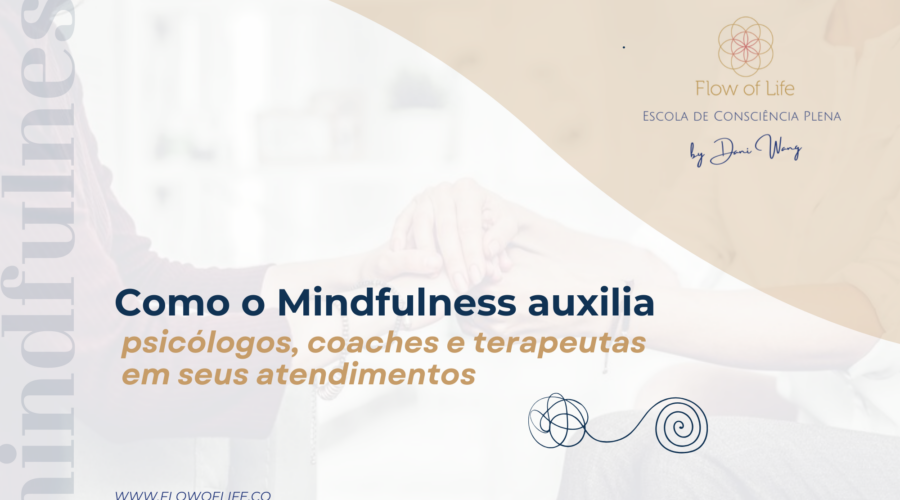After all, is practicing Mindfulness meditation or not? If you believe that Mindfulness is a technique that "just" helps you manage stress or sleep, you need to know more about the roots and power of this ancient art! In this article you'll learn in full and depth the difference and overlap between Mindfulness and meditation.
What is meditation?
The word "meditation" comes from the Latin meditateThis means being in your center, disconnecting from the outside and immersing your attention in yourself. The practice, which uses techniques to focus the mind on a particular object, thought or activity, tends to achieve a state of mental and emotional clarity, leading the person to witness their own thoughts so that their flow is then reduced.
The history of meditation goes back thousands of years and has its roots in various ancient cultures around the world. Although practices and techniques vary, the essence of meditation is rooted in the search for awareness, tranquillity and enlightenment.
The first evidence of meditation dates back to ancient civilizations such as India and China. In India, meditation began to be developed around 1500 BC and is documented in the Vedas, the sacred scriptures of Hinduism. In these scriptures, we find descriptions of meditation techniques, including concentrating the mind on a single object, such as a candle flame or a mantra (sacred sound). These practices aim to achieve a state of inner peace and unification with the divine.
In China, meditation also has a long history. Taoism, a Chinese philosophy and religion, emphasizes harmony with nature and the balance between yin and yang. Taoist meditation involves cultivating vital energy, known as qi or chi, through practices such as conscious breathing, slow movement and mental stillness.
In Buddhism, which originated in India in the sixth century BC, meditation plays a central role. Buddha Siddhartha Gautama himself attained enlightenment through the practice of meditation under a fig tree, becoming an example for the followers of what later came to be dogmatized as 'Buddhism'. Buddha's discourses gave rise to many ways of developing understanding, compassion and liberation from suffering, including Mindfulness, which we'll explore again shortly in this article...
Over the centuries, from these cradles, meditation has spread all over the world, influencing different religious and spiritual traditions. For example, in Christianity, there is a long tradition of silent contemplation and prayer, with practitioners such as Benedictine monks and Christian mystics. In Islam, meditation is known as "dhikr" and involves repeating the sacred names of Allah to achieve divine closeness.
In modern times, meditation has gained renewed interest outside the religious context. At the end of the 19th century, a key figure emerged in India called Swami Vivekananda, who popularized meditation in the West. He attended the World Parliament of Religions in Chicago in 1893 and presented meditation as a beneficial practice for the mind, body and spirit.
In the following decades, meditation gained popularity in different forms, such as transcendental meditation, introduced by the Indian guru Maharishi Mahesh Yogi in the 1950s. Transcendental meditation involves repeating a personal mantra to achieve a state of mental stillness and deep relaxation.
The cradle of Mindfulness
Now that we've introduced you to some different aspects of meditation, let's get to the beginning of the story of Mindfulness, a practice that continues to grow and develop over the years.
One of the central concepts of Buddha's teaching, especially in the Theravada and Mahayana traditions, is the Eightfold Path, described as the way to attain enlightenment or spiritual awakening.
The Eightfold Path consists of eight essential and interconnected aspects:
- Right view: having a correct understanding of reality, especially in relation to the Four Noble Truths, which are: the existence of suffering, the origin of suffering, the cessation of suffering and the path to the cessation of suffering.
- Right intention: developing a right intention, based on detachment, compassion and generosity, avoiding greed, anger and cruelty.
- Correct speech: speaking honestly, compassionately and helpfully, avoiding lies, gossip, rude and harmful speech.
- Right action: acting ethically and compassionately, avoiding harming others, including not killing, not stealing, not committing sexual misconduct and not using intoxicating substances.
- Right way of life: choosing a profession or lifestyle that is consistent with ethical principles and does not harm others.
- Correct effort: cultivating mental and physical discipline, practicing meditation and striving to eliminate negative mental states and cultivate positive ones.
- Correct mindfulness: developing a clear and present awareness of the present moment, observing thoughts, sensations and actions with a calm and equanimous mind.
- Correct concentration: cultivating deep and stable mental concentration through meditation, enabling a deeper understanding of the nature of reality and the attainment of enlightenment.
These eight aspects of the Eightfold Path are considered interdependent and mutually reinforcing. By following the Eightfold Path, practitioners develop wisdom, compassion and a peaceful mind, while working to overcome suffering and achieve spiritual liberation.
The English term "Mindfulness" is a contemporary translation of this ancient concept presented in the Eightfold Path. If we explore the meaning in Pali, an ancient Indian language, of the root term "Sati", a better translation would be "to remember". Which brings us to the following reflection: are we remembering to be fully mindful in the here and now?
This explains the skill we strengthen by practicing Mindfulness: we recover our ability to be attentive and present in the present moment, observing external events without judgment, and aware of the impact they have on us, causing bodily sensations, thoughts and feelings to arise. A continuous training in mindfulness of the perceived world. Here at Flow of Life, we use the term "Full Awareness" because we understand that as well as developing our sensory perceptual capacity, we can cultivate a clear and open perception of the subtle universe beyond the visible that is also present in the here and now. And it is this deepening that guides us towards liberation from suffering and spiritual awakening. Profound, isn't it?
Mindfulness in the News & Neurosciences
With all this ancient power behind simply "stopping and breathing", science began to study meditation, after American researcher and professor of medicine Jon Kabat-Zinn developed the first Mindfulness program in the 1970s: MBSR (Mindfulness-Based Stress Reduction), which integrates mindfulness practices in a secular context, i.e. unrelated to any religious affiliation, with the aim of improving the health and general well-being of his patients suffering from chronic pain. Kabat-Zinn made a major contribution to bringing Mindfulness to the field of medicine and psychology, advocating the integration of contemplative practices in health care and the promotion of emotional well-being.
With a broader and more distinct view of religion, meditative practices, including Mindfulness, have been the subject of studies in the field of neuroscience, and various studies have provided evidence of the effects on the brain and cognitive functioning. Some of the main findings and evidence from neuroscience in relation to mindfulness are:
- Brain plasticity: Studies have shown that the regular practice of Mindfulness can lead to structural and functional changes in the brain. For example, research using functional magnetic resonance imaging (fMRI) has shown that practicing Mindfulness is associated with increased activity in areas of the brain related to emotional regulation, attention and self-regulation.
- Reduced stress and anxiety: Mindfulness practice has been associated with reduced stress and anxiety. Studies using fMRI and other brain imaging techniques have shown a decrease in activity in regions of the brain associated with the stress response and negative processing of emotions. In addition, an increase in activity has been observed in areas related to emotional regulation and more assertive decision-making and an improvement in outlook on life.
- Increased attention and concentration: Mindfulness practice has been shown to improve attention and concentration. Studies have shown that the regular practice of Mindfulness is associated with changes in brain activity related to attentional control, increasing the ability to concentrate and the ability to direct attention to the present moment.
- Improved emotional regulation: Mindfulness practice has shown positive effects on emotional regulation. Research suggests that Mindfulness training can help decrease emotional reactivity, promote the ability to observe emotions without judgment and increase emotional resilience.
- Well-being and quality of life: Studies have shown that practicing Mindfulness is associated with improvements in general well-being and quality of life. Research has found correlations between practicing Mindfulness and higher levels of life satisfaction, resilience, empathy and self-esteem.
It is also worth pointing out that neuroscience is still constantly evolving and there is much more to be discovered about the effects of Mindfulness on the brain and human functioning. However, the evidence to date suggests that practicing Mindfulness can have significant benefits for mental, emotional and cognitive health. Does anyone who practices it still doubt this?
Thanks to international protocols, studies into the effect of Mindfulness are advancing on how to help people deal with stress, chronic pain, anxiety, depression and other challenges related to mental health and well-being.
Both the well-known MBSR protocol and MBCT (Mindfulness-Based Cognitive Therapy) are structured eight-week programs that combine meditation, gentle body practices (such as yoga), and instructions on how to apply mindfulness in everyday life. They require a commitment from participants to practice Mindfulness regularly in order to generate results in emotional self-regulation, reduce stress and increase resilience and provide scientific evidence to support their effectiveness, including in pain management situations and prevention of depressive relapses. These approaches have been integrated into various fields, including medicine, clinical psychology and well-being promotion, and are widely used in hospitals, clinics and often recommended as a complementary or alternative approach to pharmacological and psychiatric treatment around the world.
And behind the research structures, we find great thinkers! Today we have some references from names in the fields of spirituality, science and business who, although they come from different traditions, have influenced and continue to influence the history of Mindfulness in Brazil and around the world in a contemporary context. Some emphasize the importance of cultivating compassion and spiritual awakening as paths to personal transformation and the creation of a more harmonious world. I mention some of them:
- Thich Nhat Hanh: was a Vietnamese Buddhist monk, poet, author and peace activist. He is one of the best-known leaders of the "engaged Buddhism" movement, which promotes the application of Buddhist teachings to personal and social transformation. Thich Nhat Hanh is widely recognized for popularizing the practice of mindfulness and bringing Buddhist wisdom to Western audiences. He emphasized the importance of full awareness in the present moment, compassion and the interconnectedness of all beings.
- Dr. Marcelo Demarzo: Medical doctor from USP and post-doctorate in Mindfulness and Health from the University of Zaragoza (Spain), he is the founder and current coordinator of the Brazilian Center for Mindfulness and Health Promotion - Open Mind, the academic arm of the Paulista School of Medicine at UNIFESP. He is a reference in scientific studies on Mindfulness in Brazil.
- Lama Jangchub Reid: He has been a meditation teacher since 1973 and established the Namgyal house in Botucatu (SP). In 2013, he started the Mindfulness instructor training course offered by Mindfulness Trainings International (MTI), which he founded. He is also a founding member of the Abramind Mindfulness Network.
And of course, we have women of great influence:
- Ellen Langer: She is a professor of psychology at Harvard University and the author of several popular books. American social psychologist known for her pioneering and influential research in the field of the psychology of ageing, decision-making and Mindfulness. Her work is centered on understanding the role of awareness and mindfulness in everyday life and aging, where she proposes the theory of "rigid mindfulness versus flexible mindfulness", arguing that by cultivating a more informal, everyday approach with openness to experiences, it is already possible to increase well-being and quality of life. Although Ellen Langer is not directly associated with the development of specific mindfulness programs, her research has helped bring mindfulness into the realm of psychology and health.
- Danielle Wang: is a former executive who suffered from burnout and has dedicated her studies and career since 2015 to promote Mindfulness for self-development, well-being and awakening of consciousness. It'sShe is the author of the book "Full Consciousness: Entrepreneurship with Mindfulness and Purpose" and offers Mindfulness instructor training by Mindfulness Trainings International (MTi).
Her School of Mindfulness, Flow of Life, is a highlight in Brazil today with its pioneering and innovative approach, combining the depth of ancient wisdom with accessible and practical ways of absorbing the teachings, easily incorporating them into everyday life. Aware of the challenge of maintaining the discipline of practice, Dani Wang has developed a continuous learning journey, offering courses for beginners, in-depth retreats and instructor training, including the MBA (Mindfulness Based on Abundance). Her corporate background offers an extraordinary language for introducing and maintaining mental health training in companies.
How about starting practicing NOW? Come and learn with us the art of 'remembering' your essence and power! Our Flow of Life school has open arms to welcome you.
Click here to find out how we can help you: www.flowoflife.co




